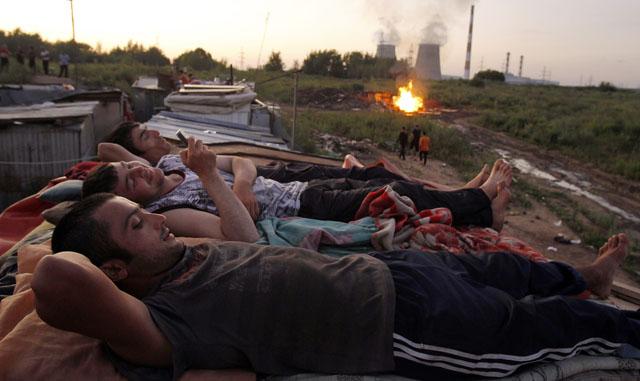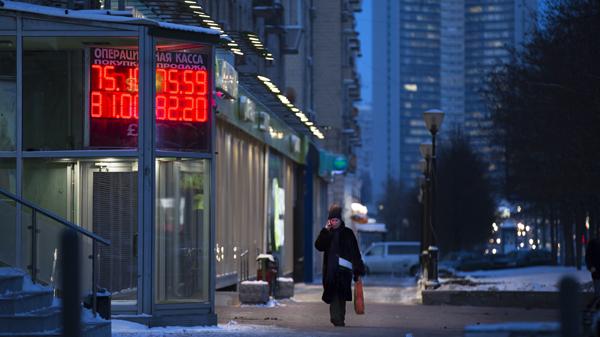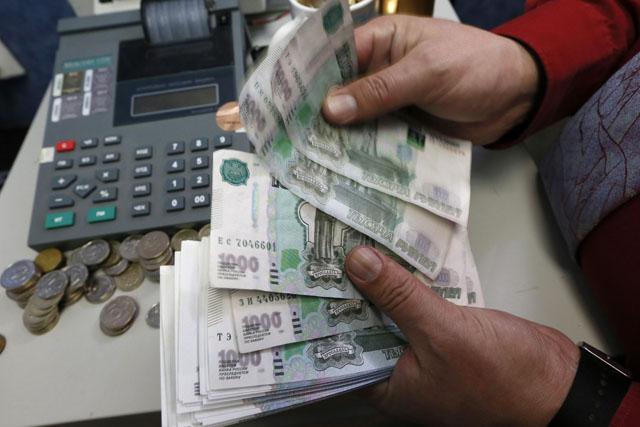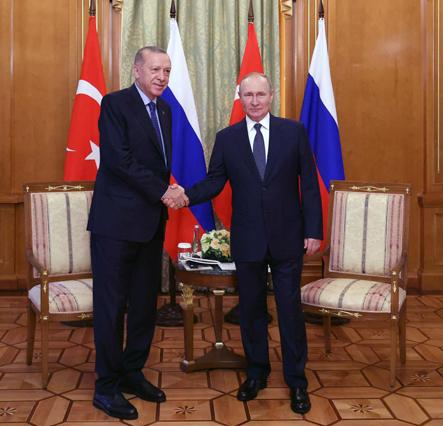You are here
Central Asian migrants feel pain of Russia's economic downturn
By Reuters - Dec 03,2014 - Last updated at Dec 03,2014

DUSHANBE/BISHKEK — Vali Salimov quit his job at a Moscow supermarket last month after his salary was halved, and returned home to Tajikistan another migrant victim of Russia's economic downturn whose family livelihood now looks precarious.
Salimov, like millions of other migrants, used to send much of his salary back home. So as he and others leave Russia, the economies of their home countries — poor former Soviet republics like Tajikistan and Kyrgyzstan — are also feeling the pinch.
"I was paid 25,000 rubles ($536) a month. Then they started paying me just 15,000 rubles. My boss said his revenues had dropped," Salimov, a father of three who also supports his elderly parents, said in the Tajik capital, Dushanbe.
Nonetheless, the 35-year-old — who could only afford to eat cheap instant noodles in Moscow — still hopes to return to Moscow in the spring. No matter how stacked the odds look, he has even less chance of finding work in Tajikistan.
On a World Bank calculation, Tajikistan was the world's biggest recipient of migrant workers' remittances last year at 42 per cent of the gross domestic product.
The share in neighbouring Kyrgyzstan was 32 per cent, demonstrating a similar number of workers suffering the knock-on effects of the crisis in Russia, which has seen its economic growth and currency collapse as a result of falling oil prices and Western sanctions imposed over the crisis in Ukraine.
Mukhayo Zhorobayeva, a 45-year-old teacher in southern Kyrgyzstan, relies on the 26,000 rubles a month that her husband sends home from his job at a confectionery distributor in St Petersburg.
"He was not paid in October. I don't know why," she said. "I watch the news and think my husband's problems could be linked to those sanctions — they are selling fewer sweets now."
Adding to the family's troubles, her 23-year-old son Saidmaksud, a cook in the Russian city of Perm, recently returned home because his work permit expired.
Safety valve
About 1 million Kyrgyz citizens and over 1 million Tajiks — about half each country's workforce — work in Russia.
For Tajikistan, a state of 8 million bordering Afghanistan and China, having so many of its citizens earning a living in Russia has helped bring stability following a 1992-97 civil war. The same goes for Kyrgyzstan, a country of less than 6 million where two presidents have been overthrown since 2005.
The prospect of those workers returning home has raised not just concern about the economic impact but also worry that high unemployment could exert intense pressure on the population.
"Even partly losing this outlet to Russia could give rise to social discontent domestically, particularly if the Russian economic downturn is protracted," said Lilit Gevorgyan, senior economist at IHS Global Insight.
Worker remittances to Tajikistan dropped by $162 million to $2.517 billion in January-September, International Monetary Fund (IMF) data showed. As a result, Tajik growth will slow to 6.5 per cent this year from 7.4 in 2013, according to Jonathan Dunn, the head of an IMF visiting mission to Tajikistan.
Tajikistan's budget envisages gross domestic product (GDP) growth of 7 per cent in 2015. But a Tajik official, declining to give his name, said: "We hope for real growth of 4 to 5 per cent, and these are the most optimistic expectations."
The reality is that Russia's economic problems are likely to result in a worsening situation in Tajikistan and Kyrgyzstan.
"Our view is that growth will decline further because we expect the remittances will decline further," Dunn said.
Separately, the Russian economy ministry on Tuesday slashed its economic forecast for 2015, announcing a contraction of 0.8 per cent because of Western sanctions over the Ukraine crisis combined with falling oil prices.
The ministry cut its previous outlook of 1.2 per cent growth by two percentage points, referring to worsening economic indicators and a "more conservative" assumption that Western sanctions will remain through 2015.
Plunging oil prices also led to the revision, with a weakening ruble and rising inflation slowing consumer spending, the ministry added in its official statement.
In its outlook on recession, Deputy Economy Minister Alexei Vedev said the economy may completely flatline or slightly shrink in the fourth quarter of 2014, which could push Russia into recession by the end of the first quarter next year.
The technical definition of a recession is two successive quarters of economic contraction. It would be Russia's first recession since 2009.
The ministry previously assumed Western sanctions would be lifted during 2015, with Russia then ending its tit-for-tat food embargo.
"The current forecast for 2015 is, on the contrary, based on continuing strong geopolitical risks," the ministry said.
"Uncertainty and lack of economic confidence caused by harsher geopolitics have led to a prediction of higher capital flight and lower investment," the ministry added in the full report briefly posted on its website before it was removed.
Capital flight is expected to reach $125 billion for 2014, the ministry indicated, up from the previous estimate of $100 billion.
The World Bank also slashed its growth projection for Russia Tuesday from 0.5 per cent in 2014 and 0.3 per cent 2015 to 0.7 per cent and 0 per cent respectively.
Nine per cent inflation seen
Russia's economy has been hit by falling oil prices which have battered Russia's energy-driven economy and triggered a record drop in the value of the ruble.
The Russian currency experienced its worst slump since 1998 on Monday. After rallying slightly Tuesday morning it lost all its gains and was trading at around 53.9 to the dollar and 66.8 to the euro at 1600 GMT.
The economy ministry has forecast the foreign exchange rate to average 49 rubles to the dollar next year — 30 per cent higher than its previous expected rate of 37.7 rubles.
The growth forecast for 2014 was slightly raised from 0.5 per cent to 0.6 per cent due to a better-than-expected performance of the agricultural sector, the ministry said.
Vedev said the ministry expects the Russian economy to reach bottom in mid-2015 and begin a rebound on rising oil prices which could climb back to $85-$95 a barrel.
Russia's growth has slowed dramatically in recent years, the rate falling to 1.3 per cent in 2013 compared with 3.4 per cent the previous year.
Meanwhile, inflation has accelerated over the ruble's falling value, and is set to reach 9 per cent by the end of 2014, Vedev said, up from the previous estimate of 7.5 per cent.
Real incomes of Russians will shrink by 2.8 percent next year instead of increasing by 0.4 per cent as previously predicted, due to inflation and slowing economic activity.
Alfa Bank economists said in a note Tuesday that 12 per cent inflation for the year was "inevitable", predicting spending to fall even further than during the 2008 economic crisis due to the government's inability to compensate the population through increasing pensions and salaries.
Retail giants and foreign companies have already hiked prices or announced expected hikes because of the ruble's slump, with Apple raising Russian prices by about 25 per cent.
Related Articles
BERLIN — President Vladimir Putin acknowledged Monday in an interview with German daily Bild that Western economic sanctions over the Ukrain
Many Russians are buying dollars and hoarding cash, increasingly concerned by a slide in the ruble and wary of possible restrictions on bank withdrawals as President Vladimir Putin blames currency woes on speculators and the West.
ISTANBUL — President Recep Tayyip Erdogan has confirmed that Turkey will start paying for some of its Russian natural gas imports in rubles.



















